Ferdinand Marcos’ elections: Not the same as the one his son is now taking part in
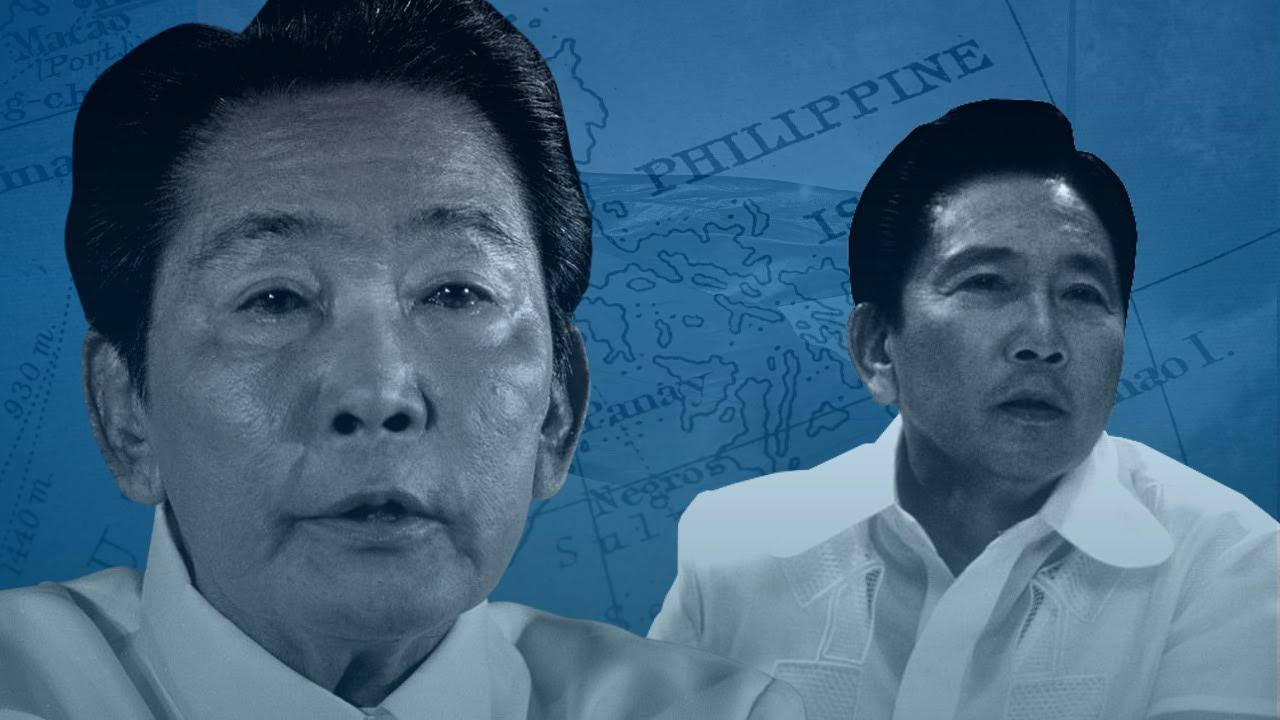
Artwork by Daniella Marie Agacer
MANILA, Philippines—Ferdinand Marcos Jr.’s participation in democratic elections, as he is now doing, would have been unthinkable during the 21-year reign of his father, the late dictator Ferdinand Marcos, for a simple reason—there was neither democracy nor democratic elections during the time.
Elections are said to be the single most effective tool for people to bring about change but during the Marcos dictatorship, this option ceased to exist.
In 1973, as the 1935 Constitution presented itself as the biggest obstacle to a third term that would violate the limit on a president’s tenure, Marcos had already declared martial law and cancelled elections.

Graphic by Ed Lustan
Marcos had been elected president in 1965 and won reelection in 1969 which gave him eight years in power that was supposed to end in 1973, an election year under the 1935 Constitution.
But Marcos had other things in mind. He did not want to yield power to a duly-elected successor and would cling to it until 1986, the year he was toppled by a generally bloodless military-backed revolt and he and his family were forced into exile.
Article continues after this advertisementFrom 1965 to 1986—a total of 21 years—Marcos kept a tight grip on power and elections as we know it today were non-existent.
Article continues after this advertisementNowadays, social media is teeming with narratives about the Marcos years being a golden age which fact checkers found to be embellished or worse, straightaway lies.
These narratives, according to Catholic Bishops Conference of the Philippines president and Caloocan Bishop Virgilio David in comments made last Jan. 15, glossed over one truth—that Marcos clung to the presidency simply because he wanted to stay in power.
READ: CBCP head: Marcos dictatorship not a ‘golden age’ for PH
Among the biggest casualties of this one-man rule was elections.
David Wurfel, a political science expert, said in his article “Martial Law in the Philippines: The Methods of Regime Survival” that Marcos clung to power beyond 1973 through transitory provisions in the 1973 Constitution which gave his rule legitimacy.
At no other time in Philippine history did elections cease to exist. The only other period when elections were not held was during World War II.
READ: Marcos’ martial law: Golden age for corruption, abuses
Tillman Durdin, a New York Times correspondent, said in his article “The Philippines: Martial Law, Marcos-Style” that Marcos proved that “once dictators consolidate power, they can usually be assured of long, often lifetime, tenure of office.”
Wurfel said initially, it looked like Marcos was content with staying on as president through a new Constitution, the one framed in 1973 by a constitutional convention that Marcos made happen but which Wurfel said was filled with delegates known to be followers, lieutenants or allies of Marcos.
Events leading to Marcos’ declaration of martial law would point to the fake ambush of then defense minister Juan Ponce Enrile as among the most pivotal developments that created justification for one-man rule.
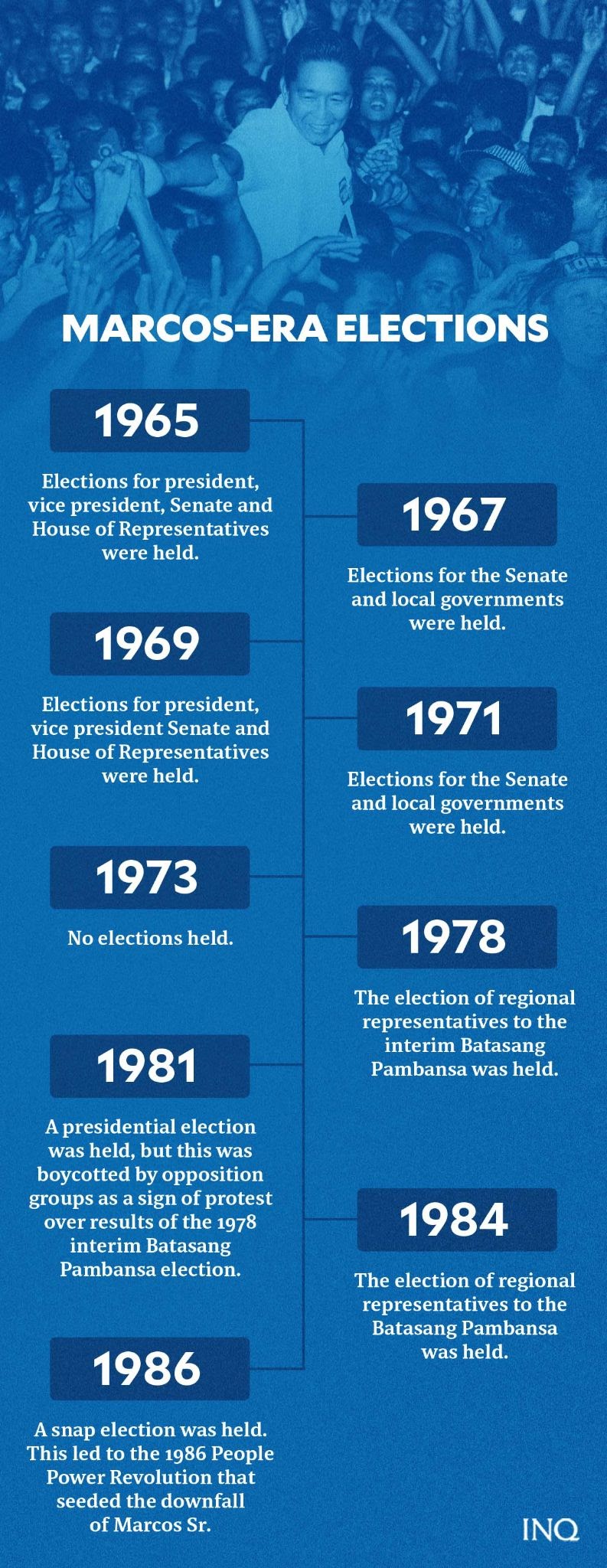
Graphic by Ed Lustan
These events, according to Wurfel, “would permit a more forceful intervention while he still possessed the precious advantage of incumbency.” By becoming a dictator, Marcos soon governed by decrees, Wurfel said.
The Official Gazette revealed that in 1969, Enrile was told to research the powers vested in the President as commander-in-chief by the 1935 Constitution. In 1970, a “confidential report on the legal nature of martial law” reached Marcos’ desk.
Weakening laws
Carmencita Aguilar, a retired political science professor of the University of the University of the Philippines Diliman, said despite the prevailing resentment against dictatorship, the Marcos regime was able to live through more than 20 years. But why?
She said in the article “The Marcos Rule and its Dynamics of Political Control” that one of the reasons was this—the late dictator “had the resourcefulness to subvert the Constitution and the laws to make all his violation of the democratic principles, legal and constitutional.”
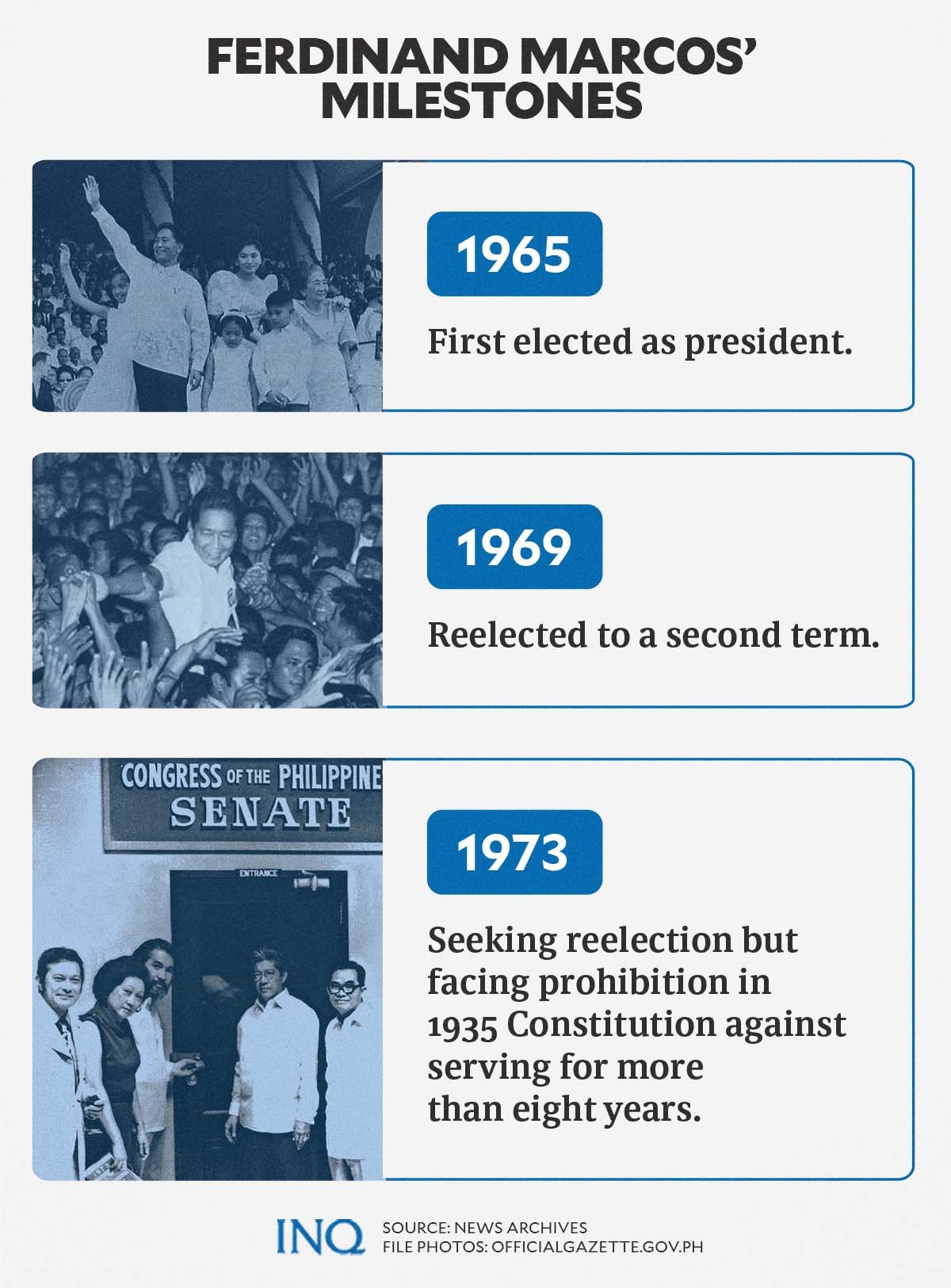
Graphic by Ed Lustan
Julio Teehankee, a political science professor of the De La Salle University, said in his book “Electoral Politics in the Philippines” that elections were not held for the first six years of the dictatorship––1972 to 1978. This was because the 1973 Constitution took effect only on Jan. 17, 1973.
How did Marcos skirt the eight-year term limit on a president’s tenure set by the 1935 Constitution? Here’s a look back:
- June 1, 1971
A constitutional convention was convened to draft a new Constitution. Peter Khan, who wrote the book “The Philippines Without Democracy,” said the new Constitution was viewed as Marcos’ way of evading the 1935 Constitution’s eight-year term limit.
- Sept. 21, 1972
Marcos declares martial law through Proclamation No. 1081. Aguilar said the declaration was defended by the regime as a response to the “threatening conditions created by street demonstrations in Manila composed of students, workers, peasants, and some intellectuals.”
- Jan. 17, 1973
Proclamation No. 1102 “certified and proclaimed” that the Constitution drafted by the 1971 constitutional convention has been ratified overwhelmingly by votes cast in Citizens Assemblies held nationwide.
The transitory provisions of what would become the 1973 Constitution said the President shall continue to exercise his powers and prerogatives under the 1935 Constitution plus the powers vested in a new position of power—Prime Minister.
- July 27 to 28, 1973
As declared in Presidential Decree No. 1229, a referendum was held on whether Marcos should continue in office beyond 1973 and finish the reforms he started under martial law.
- Feb. 27 to 28, 1975
The regime said the people, in a referendum, approved of the manner Marcos has been exercising his powers vested in him by martial law and the 1973 Constitution.
- Oct. 16 to 17, 1976
The amendments to the 1973 Constitution provided that Marcos, as President, would also be Prime Minister and continue to exercise all his powers even after the election and forming of a lawmaking body, the Batasang Pambansa, and its readiness to discharge its legislative functions.
- Dec. 17, 1977
A referendum was held on whether Marcos should continue in office as President and become Prime Minister after the organization of the interim Batasang Pambansa.
‘Fond of referenda’
The book “The Philippines Reader: A History of Colonialism, Neocolonialism, Dictatorship, and Resistance” said that to give his dictatorship the cover of legitimacy, Marcos resorted to referendums, the results of which, according to historian Antonio Montalvan, were mostly rigged.
Montalvan said Marcos had been fond of referendums—five were held from 1973 to 1977.
Aguilar said while Marcos branded referendum results as a mandate of the people showing trust in his leadership, critics said results were manipulated.
Proclamation No. 1102 said people who took part in the Citizens Assemblies were asked these questions: Do you approve of the new Constitution? Do you still want a plebiscite to be called to ratify the new Constitution? Marcos declared that 14,976,561 voted for the new Constitution while 743,869 voted against it.
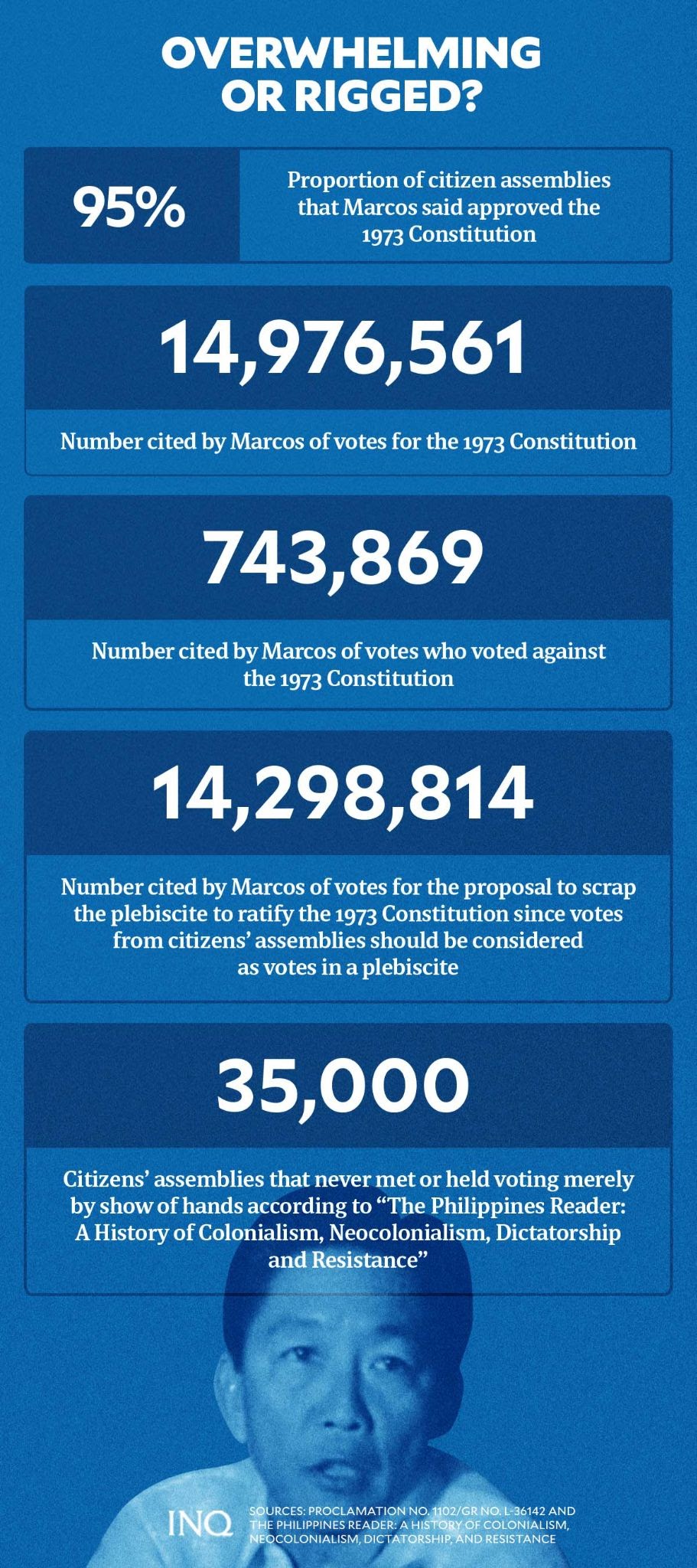
Graphic by Ed Lustan
Marcos said on the question of whether the people would still like a plebiscite to be called to ratify the new Constitution, 14,298,814 answered No and that the votes of Citizens Assemblies should be considered as votes in a plebiscite.
Since 95 percent of those called to attend Citizens Assemblies voted for the new Constitution, Marcos said the Katipunan ng mga Barangay, an assembly of village officials, strongly recommended that the vote results should be deemed as ratification of the new Constitution. Reports, however, said “most of the 35,000 assemblies never met and voting was by show of hands.”
Primitivo Mijares, then head of Marcos’ Media Advisory Council who disappeared in 1977, had written a memorandum given to the US Congress. This was discussed in the book “The Philippines Reader: A History of Colonialism, Neocolonialism, Dictatorship, and Resistance.”
Mijares said results of the 1973 referendum that ratified the new Constitution were fabricated by a group headed by the late dictator’s favorite brother-in-law. Mijares said he was a member of the group and knew what Marcos wanted to hear as “the vote” of the people.
Dark elections
While elections were still held after 1965, the year Marcos was first elected as president, the last that was held before the declaration of martial law was in 1971, the year Plaza Miranda, a place where the opposition held a campaign, was bombed.
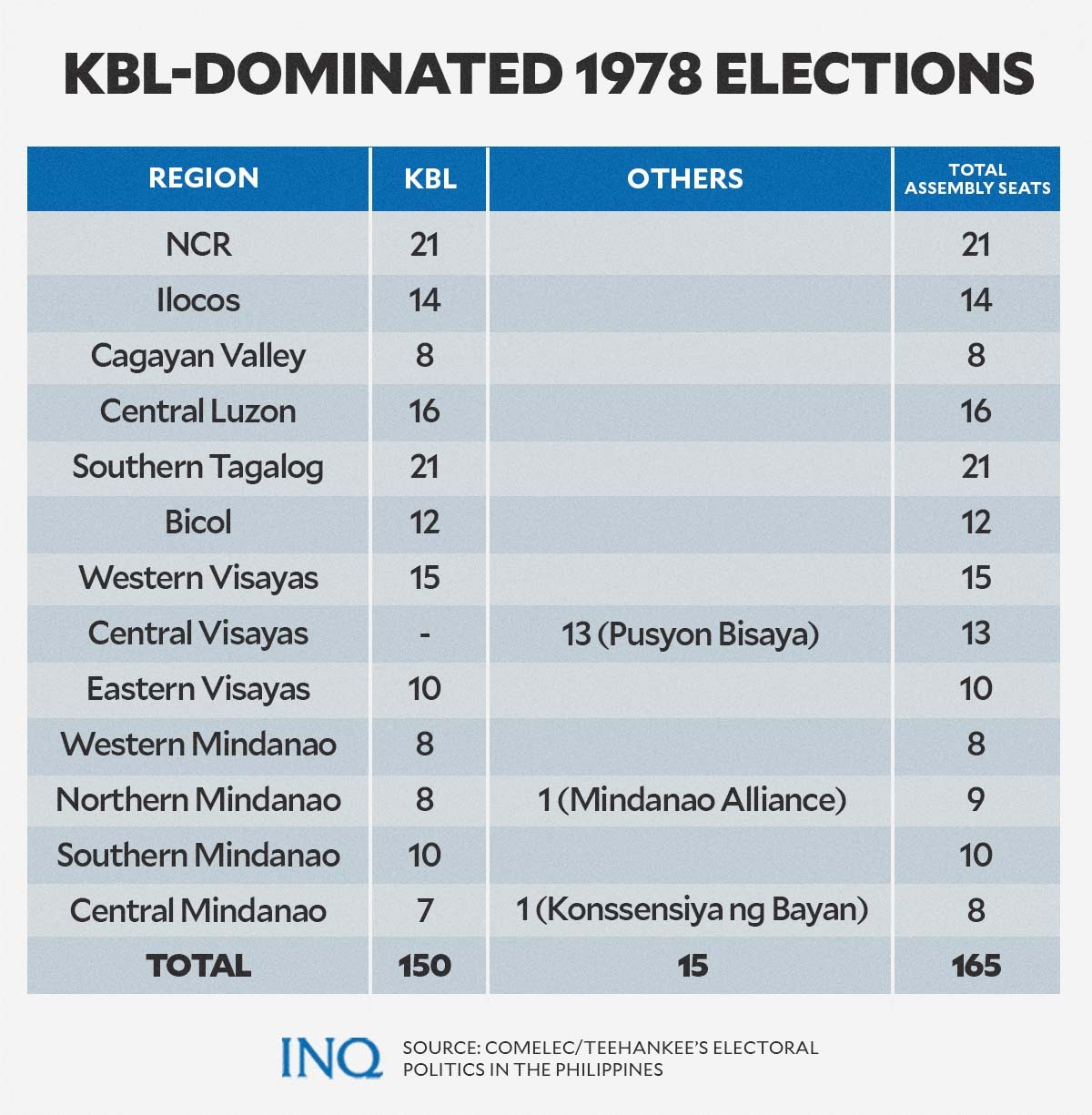
Graphic by Ed Lustan
Since elections were not held in the first six years of the dictatorship, the one that came next to the 1971 elections was held in 1978––the election of regional representatives to the interim Batasang Pambansa. In 1984, another election for Batasang Pambansa members was held.
A presidential election held in 1981 was boycotted by the opposition to protest results of the 1978 elections for the Batasang Pambansa, which gave 150 seats to the Marcos party Kilusang Bagong Lipunan (KBL).
Teehankee said the 1978 election for the interim Batasang Pambansa only had 15 winners who were not part of KBL––13 from Pusyon Bisaya, one from Mindanao Alliance, and one from Konsensiya ng Bayan.
He said the system gave KBL excessive advantage since it was the only coalition capable of mounting a nationwide campaign. Citing Tancangco (1988:96), he said the 1978 elections were open to fraud since it was easier then to fill boxes with pre-filled ballots.
“The Marcos regime allowed these electoral exercises to give itself a semblance of political legitimacy,” Teehankee said.
“However, it utilized its authoritarian powers to manipulate the electoral rules and institutions,” the DLSU professor said.
“For example, Presidential Decree No. 1296 (the election code that governed the conduct of the 1978 elections) allowed the block voting system which counts the vote for a party as a vote for all the individual candidates in the official ticket,” he said.
Hiding realities
Maria Ela Atienza, a political science professor of the University of the Philippines Diliman, said now that the late dictator’s son, Jr., is running for president but facing legal challenges, he could hide these facts and not acknowledge the actions of his father.
Even if facts would show how Marcos kept a grip on power beyond what the 1935 Constitution allowed, Atienza said the camp of Marcos Jr. was expected to employ legal technicalities when these are found to be good for the late dictator’s son and disregard facts when these are not for Marcos Jr.’s advantage.
Asked if Marcos Jr. should recognize the way his father kept the presidency when he defends himself from legal challenges against his presidential bid, Atienza said it will never happen.
READ: Sereno vs Marcos revisionism: ‘Kung walang ninakaw, walang na-recover’
She told INQUIRER.net that Marcos Jr.’s strategists thrive on spreading wrong information about his father. “This is the reason why victims of martial law and the progressives will never support him,” she said.